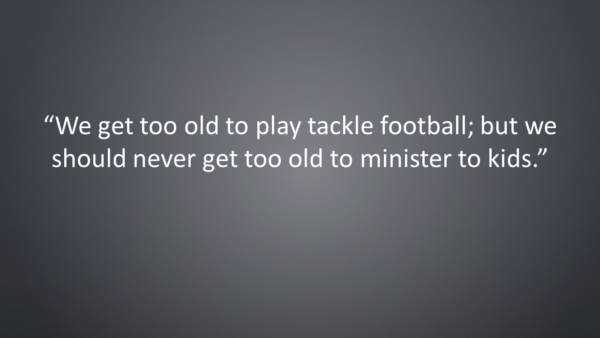How Can We Help Older People Make their Weekend Involvement in Church Less Frustrating and More Rewarding?

I always feel badly when I overhear some of the oldest people in the church complain to others about the style of music, the length of the sermon, or the fashion styles of the younger generations.
I wonder why this once active and vibrant demographic age group feels the need to express their frustration so openly as they get older.
Maybe it’s because church leaders have just accepted and even unconsciously communicated the fact that as people get older, they often become increasingly negative, they have “had their day”, and they need to just get out of the way so that younger leaders can have their turn.
The reality is probably much less dramatic and pronounced than my description. But I do think that many churches have (maybe inadvertently, but perhaps intentionally too), pushed older generations out to the proverbial pasture. Maybe older members feel like they have lost their voice and lost their influence – and so they need to share their concerns with other somewhat likeminded people in personal cynical or pessimistic conversations.
I’ve wondered for years that maybe we could put a stop to this all-too-common scenario by developing and instituting a plan to deliberately and purposefully connect the generations in the church.
(I wrote a book about this idea a few years ago entitled, “Inter-Generational Youth Ministry: Why a Balanced View of Connecting the Generations is Essential for the Church”. You can obtain a copy at: https://www.youthministryquestions.com/book-store/inter-generational-youth-ministry. This book, however, is not really a youth ministry book. Instead, it presents practical and creative ways any church can effectively connect the generations.)
Friends, I cam convinced that church leaders should prepare for the eventuality that people will get older, they may feel as if they are losing their influence, and that we can help them keep, or regain their vital and vibrate ministries in the church by providing ways that they can have a growing voice and influence with younger people.
Here are a few practical ideas to consider:
- Encourage your church’s oldest generations to pray specifically and individually for young people.
Take any opportunity you have to visit with your church’s older people to ask them to specifically and intentionally pray for the young people in your church. Do whatever you can to facilitate this action step. Give them a list of names, give them copies of the kids’ school pictures. One church made “baseball-card-size” info cards of every kid in the youth group to help that church’s senior citizens pray specifically for their kids.
- Motivate your church’s older people to develop friendly and growing relationships with younger people by utilizing space in the church foyer for simple, friendly greetings and conversations.
Once your church’s older people are praying specifically and individually for young people, ask them to introduce themselves to the young people in the public spaces of your church, most likely in the church foyer or in the church auditorium. Yes, the young people may, at first, think it’s odd for the older people to greet them in this way. But ask the seniors to be persistent. In the long run, most young people would appreciate these simple, yet effective demonstrations of care and encouragement. One youth worker told me recently that their church asks the senior citizens to “show up and be nice” to kids. Honestly, this step goes a long way in connecting the generations.
- Ask your church older people to utilize some of their resources to be generous and charitable with young people.
I get it that these action steps may have just turned much harder and more difficult to implement. But I’m really not talking here about finances or other tangible means of charitable giving. In many cases today, older people have the available resources of their time, some of their energy, or their life skills and experiences that they can share with young people. Older people can certainly pray. They can send prayer notes or encouragement cards. They may be able to bake cookies or brownies. They can share their personal testimony with younger people. My Mom invested in young people by showing some of the girls in her church how to make quilts. My Mother-in-Law used her musical skills to teach piano lessons. Really, the ideas are endless.
- Schedule simple, yet creative ways to connect the generations for social, fellowship events in your church.
Your church can do this one easily. I know several churches that host enjoyable and beneficial inter-generational functions each year. I visited in one church recently that scheduled simple games nights each year with round tables set up in the church’s family room for table games, simple crafts, and fellowship. The ages were interspersed throughout the tables, and the youth group provided the refreshments, while the older people were encouraged to take the time to engage in personal and encouraging conversations.
- Plan opportunities for some of your church’s oldest and most faithful members to share their story of God’s faithfulness with the younger generations in your church.
Today’s younger generations love stories. Plus, your church undoubtedly has older members with lives of faithfulness to the Lord over several decades. Plan opportunities for some of your churches oldest people to meet with the younger people to share their story or testimony of how the Lord has worked in and through their lives. You will be amazed at how these simple times of connection will develop into growing and positive inter-generational relationships in your church.
These ideas are simple, yet they will not happen without church leaders actively getting involved in the process. This doesn’t mean you have to be in charge to institute these ideas, however. You can use whatever influence you have – including your own initiative and your own persuasive abilities to ask some of your church’s older generations to get involved.
You should also actively demonstrate to them that you sincerely care about them, that you want to hear their thoughts and concerns, and that you will do everything you can to encourage your church’s younger generations to show their love and concern for older people.








